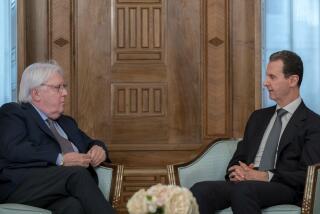Bitter Arab Summit Near Deadlock on Lebanon
- Share via
CASABLANCA, Morocco — An emergency Arab League summit seemed likely Thursday to end in deadlock, with Arab leaders unable to resolve their differences over the question of Syria’s military presence in Lebanon.
Indeed, what began three days ago in Casablanca as an attempt to find a formula for Syria’s withdrawal from Lebanon has turned instead into a frantic effort to devise a face-saving cover for the Arab League’s political paralysis on the Lebanese question.
As the summit drew to a close, it was not clear whether the approximately 20 leaders remaining in Casablanca--two of them left Morocco on Wednesday--will be able to accomplish even this.
An 11th-hour compromise being offered at the summit would, if adopted, call for a cease-fire in Lebanon and the withdrawal of “all military forces and illegal militias” from Beirut.
Dialogue Urged
It would also create a committee, chaired by Morocco’s King Hassan II, to initiate a dialogue with the heads of the various Lebanese Christian and Muslim factions on future political reforms in Lebanon.
Under the plan, the Lebanese Parliament would convene to ratify the reforms and to elect a president, who would be charged with forming a “national reconciliation” government.
The plan envisions a timetable of three months to complete all these steps, including the withdrawal from Beirut of all military forces save those of the Lebanese army, which would be charged with maintaining security.
The plan, however, contained no provision to send an Arab League peacekeeping force to Beirut, as proposed earlier by Jordan and Iraq, and its acceptance appeared uncertain.
Iraq, which has been at the forefront of an effort to censure the Syrian role in Lebanon, was said to oppose the plan, and Syria earlier told the summit that it would not consider even a partial military pullback until Israel had withdrawn all its forces from southern Lebanon.
Unable to agree on the proposal, even after a day of almost continuous and highly acrimonious talks, Arab League foreign ministers decided to defer the issue to their heads of state meeting behind closed doors at Casablanca’s royal palace.
However, Iraqi Foreign Minister Tarik Aziz made his position clear when, emerging from a late-night ministerial meeting, he told reporters that “the Syrians have shown no readiness to solve the Lebanese crisis . . . which I think is now going to deteriorate very badly.”
Iraq, Syria’s archrival in the Arab world, has made little secret of the fact that it came to this summit with blood on its mind.
Punishment Motive
“Iraq wants revenge,” a senior diplomat here said. “It wants to punish Syria for supporting Iran in the (Persian) Gulf war.”
Lebanon is clearly the ground on which the Iraqis have chosen to wage their new war with the Syrians. At a closed-door meeting of the heads of state Wednesday night, Iraqi President Saddam Hussein delivered a fierce denunciation of Syria’s role, past and present, in the Lebanese crisis.
This denunciation provoked a heated response from Syrian President Hafez Assad, who reiterated Syria’s determination to “continue keeping the peace” in Lebanon, summit sources said.
Syria Rejects Troops Plan
The sources added that the Syrian leader likewise rejected a proposal by Jordan’s King Hussein to send a pan-Arab peacekeeping force to Beirut to shoulder, as he put it, “some of the burden that Syria and its forces have been bearing in Lebanon.”
With Syrian and Iraqi horns firmly locked over Lebanon, the summit chiefs kicked the Lebanese question back to their foreign ministers, who met throughout the day Thursday in an effort to work out a compromise.
But the ministers also found themselves deadlocked on the issue. Conference sources described Thursday’s talks as heated and even abusive, as the Syrian and Iraqi foreign ministers resumed the verbal battle begun by their heads of state the night before.
According to one source who attended the meeting, Iraq’s Aziz told his fellow ministers at one point that “each of you knows you want the Syrians out of Lebanon, but none of you will dare to say it here.”
“If this is not true,” he challenged them, “then call me a liar.”
Other sources said that Syrian Foreign Minister Farouk Shareh then quickly obliged his Iraqi counterpart, touching off a heated exchange in which epithets such as “liar,” “demagogue” and “terrorist” were hurled across the conference room.
This summit marked Egypt’s return to the Arab fold after a decade of ostracism following its peace treaty with Israel. The gathering, begun with high hopes that Egypt’s readmission would strengthen Arab unity, especially among the moderate states here, has in fact served mostly to underline the differences that it was intended to solve.
Jordan’s Hussein tested his already precarious relations with Assad by proposing the peacekeeping force for Lebanon, an idea that the Syrians strenuously oppose. Saudi Arabia, which seems to have trouble deciding whom it fears more, Syria or Iraq, tried desperately to sit on the political fence, with the result that it pleased no one.
And even Egypt, which tried to pick up the conductor’s baton and play what one diplomat described as the role of “a maestro bringing harmony to a discordant orchestra,” seems to have emerged rather in a daze from its attempts to harmonize the Lebanese crisis.
More to Read
Sign up for Essential California
The most important California stories and recommendations in your inbox every morning.
You may occasionally receive promotional content from the Los Angeles Times.













